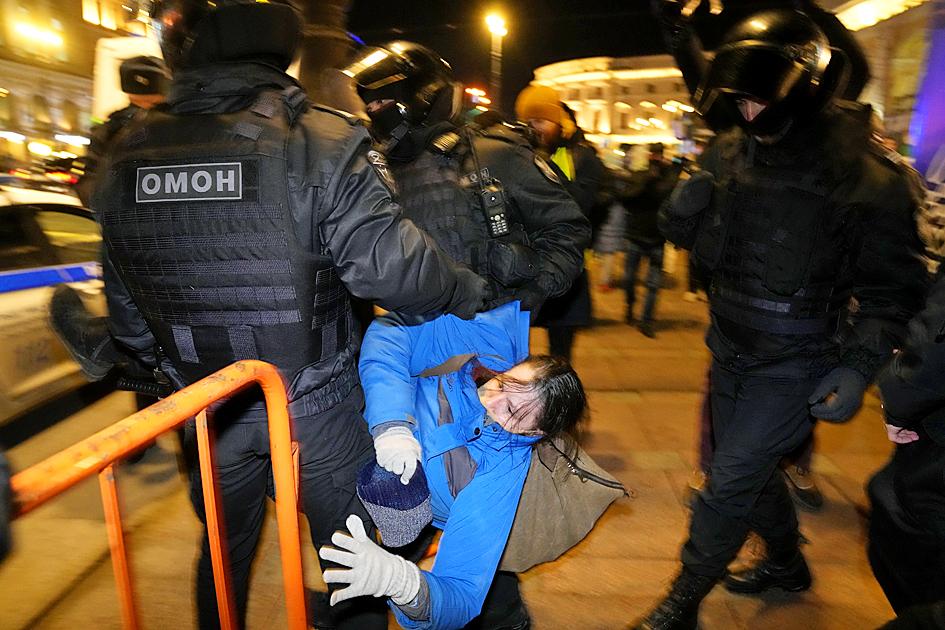As Russian troops were closing in on the Ukrainian capital, more and more Russians spoke out on Saturday against the invasion, even as the government’s official rhetoric grew increasingly harsher.
Street protests, albeit small, resumed in the Russian capital, Moscow, the second-largest city of St Petersburg and other Russian cities for the third straight day, with people taking to the streets, despite mass detentions on Thursday and Friday.
OVD-Info, a rights group that tracks political arrests, said that at least 460 people in 34 cities were detained over anti-war protests on Saturday, including more than 200 in Moscow.

Photo: AP
Open letters condemning Russia’s invasion of Ukraine kept pouring, too. More than 6,000 medical workers put their names under one on Saturday, more than 3,400 architects and engineers endorsed another, while 500 teachers signed a third one.
Similar letters by journalists, municipal council members, cultural figures and other professional groups have been making the rounds since Thursday.
A prominent contemporary art museum in Moscow, called Garage, announced on Saturday that it was halting its work on exhibitions and postponing them “until the human and political tragedy that is unfolding in Ukraine has ceased.”
“We cannot support the illusion of normality when such events are taking place,” the statement by the museum read. “We see ourselves as part of a wider world that is not divided by war.”
An online petition to stop the attack on Ukraine, launched shortly after it started on Thursday morning, garnered more than 780,000 signatures by Saturday evening, making it one of the most supported online petitions in Russia in the past few years.
Statements decrying the invasion even came from some parliament members, who earlier this week voted to recognize the independence of two separatist regions in eastern Ukraine, a move that preceded the Russian assault.
Two lawmakers from the Communist Party of the Russian Federation, which usually toes the Kremlin’s line, spoke out against the hostilities on social media.
Lawmaker Oleg Smolin said he “was shocked” when the attack started and “was convinced that military force should be used in politics only as a last resort.”
His fellow lawmaker Mikhail Matveyev said “the war must be immediately stopped” and that he voted for “Russia becoming a shield against the bombing of Donbas, not for the bombing of Kyiv.”
Meanwhile, Russian authorities took a harsher stance toward those denouncing the invasion, both at home and abroad.
Dmitry Medvedev, the deputy head of Russia’s Security Council chaired by Russian President Vladimir Putin, said Moscow might respond to Western sanctions by opting out of the last nuclear arms deal with the US, cutting diplomatic ties with Western nations and freezing their assets.
He also warned that Moscow could restore the death penalty after Russia was removed from Europe’s top rights group — a chilling statement that shocked human rights activists in a country that has had a moratorium on capital punishment since August 1996.
Eva Merkacheva, a member of the Kremlin human rights council, deplored it as a “catastrophe” and a “return to the Middle Ages.”
On Saturday, Russian Internet users reported problems with accessing Facebook and Twitter, both of which have played a major role in amplifying dissent in Russia in the past few years.

MONEY GRAB: People were rushing to collect bills scattered on the ground after the plane transporting money crashed, which an official said hindered rescue efforts A cargo plane carrying money on Friday crashed near Bolivia’s capital, damaging about a dozen vehicles on highway, scattering bills on the ground and leaving at least 15 people dead and others injured, an official said. Bolivian Minister of Defense Marcelo Salinas said the Hercules C-130 plane was transporting newly printed Bolivian currency when it “landed and veered off the runway” at an airport in El Alto, a city adjacent to La Paz, before ending up in a nearby field. Firefighters managed to put out the flames that engulfed the aircraft. Fire chief Pavel Tovar said at least 15 people died, but

South Korea would soon no longer be one of the few countries where Google Maps does not work properly, after its security-conscious government reversed a two-decade stance to approve the export of high-precision map data to overseas servers. The approval was made “on the condition that strict security requirements are met,” the South Korean Ministry of Land, Infrastructure and Transport said. Those conditions include blurring military and other sensitive security-related facilities, as well as restricting longitude and latitude coordinates for South Korean territory on products such as Google Maps and Google Earth, it said. The decision is expected to hurt Naver and Kakao

LIKE FATHER, LIKE DAUGHTER: By showing Ju-ae’s ability to handle a weapon, the photos ‘suggest she is indeed receiving training as a successor,’ an academic said North Korea on Saturday released a rare image of leader Kim Jong-un’s teenage daughter firing a rifle at a shooting range, adding to speculation that she is being groomed as his successor. Kim’s daughter, Ju-ae, has long been seen as the next in line to rule the secretive, nuclear-armed state, and took part in a string of recent high-profile outings, including last week’s military parade marking the closing stages of North Korea’s key party congress. Pyongyang’s official Korean Central News Agency (KCNA) released a photo of Ju-ae shooting a rifle at an outdoor shooting range, peering through a rifle scope

Australian Prime Minister Anthony Albanese yesterday said he did not take his security for granted, after he was evacuated from his residence for several hours following a bomb threat sent to a Chinese dance group. Albanese was evacuated from his Canberra residence late on Tuesday following the threat, and returned a few hours later after nothing suspicious was found. The bomb scare was among several e-mails threatening Albanese sent to a representative of Shen Yun, a classical Chinese dance troupe banned in China that is due to perform in Australia this month, a spokesperson for the group said in a statement. The e-mail